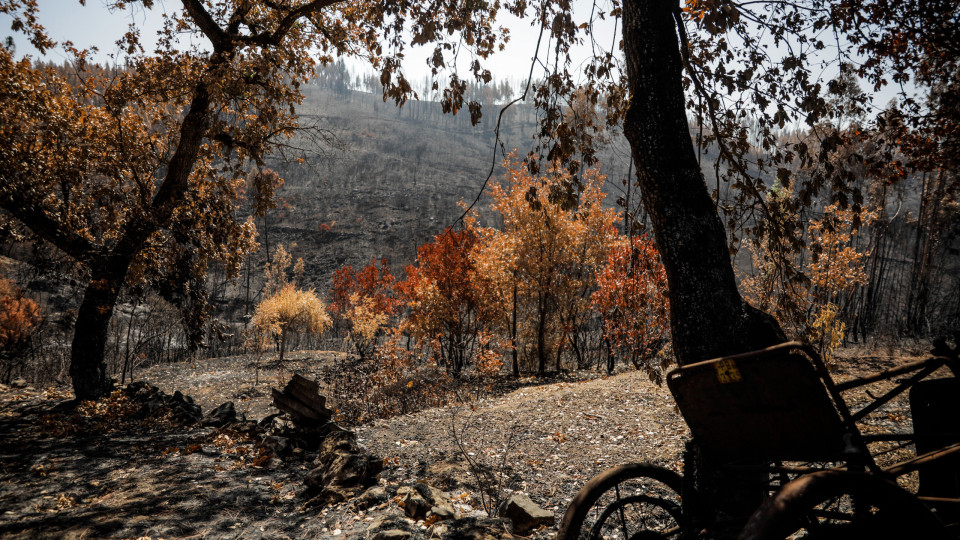Federation requests more time for cleaning up forest land
Owners must clear agricultural and forest land by April 30 to prevent rural fires, but adverse weather and a lack of manpower have led the federation of forest owners' associations to request an extension of the deadline.

© Lusa

País Incêndios
"The feeling is always the same, that for this period there can't always be a date, because nature is in charge. This year, as it rained a lot, until late, [...] the lands are still getting clogged. If the grass is cut now, the fine materials, which are the ones that spread the fires, will still burst all over", said the chairman of the board of the National Federation of Forest Landowners Associations (FNAPF).
Luís Damas noted that the deadline of the 30th of this month to conclude the fuel management "is not feasible" and, therefore, defended "the postponement until the end of May or until June 15", since, in addition to having rained a lot, "there is no manpower".
"We run the risk of doing it without any use afterwards. [There are] sprouting weeds and then when the heat of July and August comes, everything will dry out, and there will be a lot of fuel to feed the fires", he stressed.
The federation will, therefore, try with the Ministries of Internal Administration and Agriculture, which has once again become responsible for the Forests, to have "some common sense" and see that "the date is impractical this year", as happened during the covid-19 pandemic.
Be that as it may, he admitted that, also due to pressure from the authorities, it has been proven that "these strips have reduced the intensity and sometimes even changed the course of the fire".
"It is a great cost every year and sometimes there is no manpower to do it, but many people have already internalized this because, when the GNR comes around, people also get fines and they are not that small", stressed Luís Damas.
For the chairman of the board of ANEFA -- National Association of Forest, Agricultural and Environmental Companies, Pedro Serra Ramos, the management of fuel strips "is feasible", even because it seems to him that "there is a lower demand for services to clean this year".
"I think that people are starting to not have the financial capacity to carry out the cleaning every year", he noted.
The forest engineer acknowledged that the owner with financial means and who "knows that he will have to clean up is concerned about it and hires to do it very early".
With the recent rain, he said, there are "areas with some vegetation that may raise concerns", but, even so, "if the cleaning has been done properly, there will not be much of that risk".
On the other hand, Luís Damas stressed that several associations of forest producers have "teams of sappers who do this work" and each year they feel that there is "a ritual of people" resorting to the services, "both of the sappers and specialized companies in cleaning" these lands, after the tragic deaths in the fires of 2017.
In addition to cleaning 100 meters around the clusters and 50 meters around houses, the FNAPF leader highlighted that "the land occupation is changing, removing pine and eucalyptus forests and planting other crops, which are not so combustible, mainly for agricultural use, such as vineyards and olive groves, strawberry trees".
"Therefore, also creating a safety belt around the villages, with different occupation, which also forces people to have the vineyard, the olive grove treated every year and also makes the villages safer", he pointed out, assuring that "it is a path that is being taken".
For now, Luís Damas, in addition to the Village Condominium program - which supports actions to change the use and occupation of the land and the management of fuels around the clusters, financed by the Environmental Fund -, highlighted the creation of integrated landscape management areas (AIGP), articulating the planning and management of the landscape with the increase of forest area managed on a scale that promotes resilience to fires and the rural economy.
"Due to abandonment, the forest area in this territory has to be reduced and has to be interspersed with the goats, the olive groves, other land uses, so that there are no continuous patches", advocated the FNAPF leader, which brings together 41 organizations of forest owners and producers on the mainland.
In response to Lusa, AGIF - Agency for Integrated Management of Rural Fires explained that regional information (by municipalities and parishes) on the evolution of fuel management will be provided by municipalities and private entities, from this year onwards, via the Interoperable Platform (Plis), so that only from 2025 onwards will this data be "compiled and aggregated".
Leia Também: Abrantes alarga dispositivos de combate a fogos rurais a 11 freguesias (Portuguese version)

Descarregue a nossa App gratuita.
Oitavo ano consecutivo Escolha do Consumidor para Imprensa Online e eleito o produto do ano 2024.
* Estudo da e Netsonda, nov. e dez. 2023 produtodoano- pt.com






